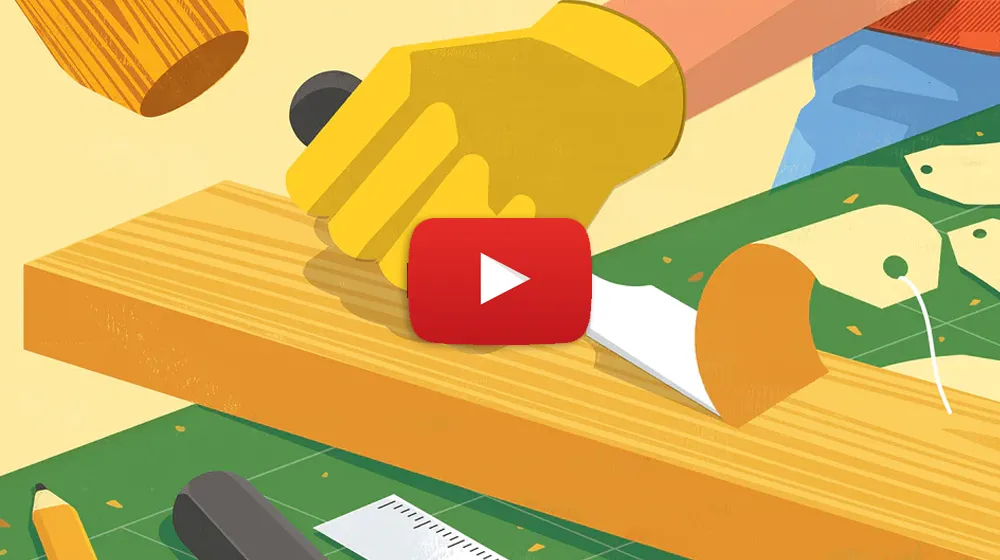GET READY: Go Novice to Master Woodworker
Every Project Imaginable with ZERO Guesswork

If You’re Here, You Know 2 Things:
1) You understand how crucial it is to have the right detailed plans to build common or completely custom projects. You’re doing this to meet a specific need (save money, learn a new skill, indulge in an awesome hobby, get the kind of quality you can’t find elsewhere etc.), but finding perfect plans can be difficult. That’s fine. You’ll see that you can address that easily enough. Step one is always getting the right plans for your skill level. Guesswork, poor descriptions, or off measurements is the kiss of death for most projects. Watch the video and you’ll see the kind of potential you’re dealing with. It’s unlike anything you’ve worked with before.
2) You know you need a plan, but where do you start? Building furniture or structures isn’t easy, unless you’ve either been in the business for decades or have access to a huge wealth of knowledge. That’s where you start. Start today by watching the video, then plug in what you want to build and begin, step-by-step. You’ll never look back and you'll blow the minds of friends and family.
Ullam qui culpa officiis quo accusamus et numquam. Non dolor exercitationem expedita et rerum. In corporis delectus et magnam rerum. Et maxime natus sed aut temporibus dolor qui.
From Novice to Master: The Woodworking Journey From Your Home
Woodworking is a timeless craft, has been the backbone of many civilizations, giving us furniture, art, and even shelter. But like any skill, it's a journey from novice to master. For the modern man looking to embark on this journey from the comfort of his home, there are steps to climb and tools to wield. Here's a few tips on how to elevate your woodworking skills with common tools and dedicated practice.
You won't find a better guide to the world of crafting your own projects out of wood than the one here. 1600 projects all laid out for you step-by-step. It doesn't matter if this is the first time you're picking up a saw or chisel, you'll be able to make it.
1. Understanding the Basics Every master was once a beginner. Begin by understanding the properties of wood, different types of timber, their strengths, and how they react to environmental conditions. Look for tried tested and true resources like the one above .Books, online resources, and tutorials can be invaluable, but are often confusing and lack essentials so be discerning. And don't just read; practice. Start with small projects like a birdhouse or a shelf.
2. Invest in Quality Tools While there are myriad tools available, as a novice, you should focus on the essentials.
These include:
- Hand saws: For basic cuts.
- Chisels: For carving and detailed work.
- Hammers and mallets: For driving nails and chiseling.
- Measuring tools: Rulers, tape measures, and squares for accurate measurements.
Remember, it's not about having the most tools but mastering the ones you have. As your skills grow, so will your tool collection.
3. Master the Techniques Technique trumps tools every time. You can have the best tools in the world, but without the proper technique, your work will reflect that of a novice. Practice basic techniques like:
Joinery:
- Learn dovetails, mortise and tenon, and lap joints.
- Planning: Understand how to get a smooth surface.
- Measuring & Marking: Precision is key in woodworking.
4. Create a Dedicated Space If possible, set up a dedicated workshop. It doesn’t have to be vast; even a corner of your garage can suffice. This space should be organized, well-lit, and ventilated. A workbench, whether bought or built, will be the centerpiece.
5. Safety First No matter your skill level, safety should always be a priority. Always wear safety glasses, ear protection when using power tools, and avoid loose-fitting clothing. Understand the safety protocols of every tool you use.
6. Learn from Mistakes Even master woodworkers make mistakes. What sets them apart is how they learn from them. If a project doesn’t turn out as expected, assess where you went wrong, and avoid repeating the same in the future.
7. Join a Community Although you're working from home, you're not alone. There are countless online forums, local clubs, and social media groups dedicated to woodworking. These communities can offer advice, feedback, and a sense of camaraderie.
8. Continuous Learning The world of woodworking is vast. Even after mastering the basics, there's always more to learn. Whether it's a new technique, a novel tool, or an emerging trend, stay updated. Consider attending workshops or taking advanced courses online.
9. Challenge Yourself Once you're comfortable with basic projects, push your boundaries. Try crafting intricate furniture pieces or dive into woodturning. With every challenge, your skills will sharpen, and your confidence will grow.
10. Teach Others Imparting knowledge is a hallmark of mastery. Whether it's helping a friend with a project, starting your woodworking blog, or hosting workshops, teaching others not only solidifies your knowledge but also gives back to the community.
Keep in mind: Woodworking is as much about patience and perseverance as it is about chisels and wood. As you journey from novice to master, remember to enjoy the process, cherish the successes, and learn from the failures. Every piece, every cut, and every joint takes you one step closer to mastery.
Finally, if you haven't watched the informational video you should do so asap. The clip below will give you a better idea of what to expect from the resource available. You won't have to go anywhere else for future projects. You'll love the amount of details and how they've broken everything down.
Copyright 2023. All rights reserved.
This site is not a part of the Youtube website or Youtube Inc. Additionally, This site is NOT endorsed by Youtube in any way. YOUTUBE is a trademark of YOUTUBE, Inc. Disclaimer: Any products represented on this website are not intended to diagnose, treat, cure, or prevent any disease. You should always consult with your physician or other health care professional before taking or adopting any form of possible treatment(s) for health-related concerns. This website takes no responsibility for use of any products herein.
